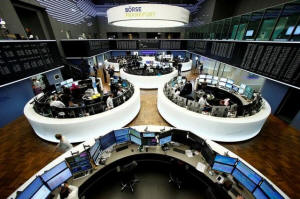|
World shares set for best week since
2011, dollar hits lowest since 2014
 Send a link to a friend
Send a link to a friend
 [February 16, 2018]
By Ritvik Carvalho [February 16, 2018]
By Ritvik Carvalho
LONDON (Reuters) - World shares were set to
post their best week of gains in six years on Friday after two
consecutive weeks spent in the red, shrugging off a rise in global
borrowing costs while the dollar hit its lowest level since 2014.
The MSCI world index of stocks, which tracks shares in 47 countries, was
up 0.4 percent after European bourses opened. <.MIWD00000PUS> After
suffering its biggest weekly drop since August 2015 last week, this
week's recovery puts the index on track for its best weekly showing
since early December 2011.
The index has now reclaimed more than half of the 10.7 percent plunge
from a record intraday high on Jan. 29 to a four-month intraday low a
week ago.
Investors have been puzzled at this week's quick rebound in stock
markets, which has also coincided with a rise in bond yields on evidence
that inflation is starting to creep up globally.
The argument most commonly offered by economists has been that
historically, it's not unusual for stocks and bond market borrowing
costs to rise in tandem with a rapidly expanding economy.

"For me it's really a question of maybe. Markets are taking a look at
the inflationary outlook and saying OK, maybe rates are going up and
maybe the economy will compensate for that," said Michael Hewson, chief
markets analyst at CMC Markets.
"That might change if we move to 3 percent on the 10-year (Treasury)."
The global rise in borrowing costs has been led by the U.S. 10-year
Treasury, which hit a four-year high of 2.944 percent this week. It last
stood at 2.8932 percent. <US10YT=RR>
Yields across the euro area were mostly steady, although Germany's
benchmark bund yield was within sight of 2-1/2 year highs and set for
its biggest weekly rise in eight weeks. <DE10YT=RR>
Investors were also watching for a sovereign debt rating on Greece from
Fitch Ratings, set for release later in the day.
European shares were set to chalk up healthy weekly gains, snapping a
three-week losing streak as earnings updates continued to impress, and
volatility and jitters over rising inflation eased. Among country
benchmarks, the UK's FTSE <.FTSE> was up 0.6 percent and Germany's DAX
<.GDAXI> added 0.8 percent, while Italy's FTSE MIB <.FTMIB>
outperformed, up 1.2 percent.
MSCI's broadest index of Asia-Pacific shares outside Japan
<.MIAPJ0000PUS> rose 0.4 percent, though many Asian markets were closed
on Friday for the Lunar New year.
Japan's Nikkei <.N225> rose 1.2 percent, with investors relieved to see
the government appoint Bank of Japan Governor Haruhiko Kuroda for
another term, suggesting the central bank will be in no rush to dial
back its massive stimulus program.
The pan-European benchmark <.STOXX> is up 3 percent so far this week,
set for its best week since December 2016, but still down around 6
percent from the 2-1/2-year peak it hit in January.
[to top of second column]
|

Traders work at their desks in front of the German share price
index, DAX board, at the stock exchange in Frankfurt, Germany
February 28, 2017. REUTERS/Staff/Remote/File Photo

Some put the rebound in equities down to investors being reassured
by a fall in the VIX <.VIX> index - a measure of implied volatility
on the S&P 500 index, also known as Wall Street's "fear gauge". The
index dropped below 20 for the first time since its spike to a
2-1/2-year high of 50.3 last week, a jump that caused massive losses
among investors who bet equity markets would be stable on a
combination of solid economic growth and moderate inflation.
DOLLAR IN THE DUMPS
Extending the previous day's losses, the dollar's index against a
group of six major currencies fell to 88.253 <.DXY>, the lowest
since December 2014. The index was on track to lose around 2 percent
on the week in its largest decline since February 2016.
There is no strong consensus yet on what is driving the dollar's
persistent weakness, especially in light of rising yields. Some say
it simply reflects a return of risk appetite and a shift to
higher-yielding currencies, including many emerging market ones.
But others cite concerns that Washington might pursue a weak dollar
strategy as well as talk that foreign central banks may be
reallocating their reserves out of the dollar.
There are also worries President Donald Trump's tax cuts and fiscal
spending could stoke inflation and erode the value of the dollar.
"His protectionist policies could also fan inflation. Markets appear
to have calmed down for now but fundamentally it is different from
last year," said Yoshinori Shigemi, global market strategist at
JPMorgan Asset Management.

"You could say that right now, rather than stocks rising around the
world, it is the dollar falling against almost everything," he
added.
Oil prices maintained this week's gains, with U.S crude futures
trading at <CLc1> $61.74 per barrel, up 4.1 percent so far this
week. Brent crude traded at $64.77 <.LcOc1>
Elsewhere, virtual currency bitcoin recovered the $10,000 mark for
the first time in two weeks <BTC=BTSP>, gaining more than 70 percent
from its near three-month low of $5,920.7.
(Reporting by Ritvik Carvalho; Additional reporting by Asia markets
team; Editing by Toby Chopra)
[© 2018 Thomson Reuters. All rights
reserved.]
Copyright 2018 Reuters. All rights reserved. This material may not be published,
broadcast, rewritten or redistributed.
Thompson Reuters is solely responsible for this content. |